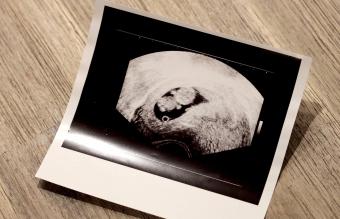
If you did not have an ultrasound at seven weeks, this may be the first time you get to see your growing baby or babies. At your eight-week appointment, your ultrasound will confirm how many fetuses are present, as well as the size, gestational age, and general health of your baby.
What You Can See on the Ultrasound
At eight weeks pregnant, your baby still resembles a small blob but is starting to look a bit more like a human baby. While doctors use an 8-week ultrasound to tell a lot about your pregnancy, in reality, you cannot see very much.
What the Fetus Looks Like
On the ultrasound screen, you will see a small peanut shaped fetus. If you've had previous ultrasounds, this one will resemble a baby much more than your last as small arms and legs are becoming more prominent. Keep in mind though, that your fetus is a little less than an inch long. You may not be able to see features easily because he is so tiny.
The Heartbeat
Baby's heart begins to beat around six weeks. During your eight week appointment, you may be able to hear your baby's heartbeat. If not, you will be able to see the fluttering movement of the heart beating away on the ultrasound screen, and will get a chance to hear it at your next checkup with a Doppler. A typical heart rate is about 110 to 175 beats per minute during this gestational period.
Movement
The baby has started moving, but he is so tiny you won't be able to feel anything for at least another month, if not longer. Likewise, it's unlikely you'll be able to see very much movement on the screen at your ultrasound appointment. However, you will be able to see tiny fluttering of the heartbeat.
Baby's Sex
Although genitalia is beginning to form, it is still too early to see what your baby's gender will be from an ultrasound. You can either wait until your second-semester ultrasound screen, which takes place around 18 to 20 weeks or request the baby's sex via a blood screen, which can be done during your Noninvasive Prenatal screen.
What Else to Expect at the Appointment
During your appointment, a nurse will take your weight and check your blood pressure. Your doctor will then ask you some routine questions, ask if you've spotted at all, and give you a general checkup to make sure you and your little one are doing well. You may need to drink water before the appointment, depending on your doctor's ultrasound equipment, and you may be asked to give a routine urine sample before having the ultrasound.
Diagnostics

During this appointment, the doctor or technician can:
- Confirm how many babies you are carrying
- See the location of the implantation (to ensure you do not have an ectopic pregnancy)
- Check the heart rate is normal
- Give you your due date based on the gestational size of your peanut
Your ultrasound can also help confirm or predict a miscarriage.
Performing the Ultrasound
During the ultrasound, your doctor or ultrasound technician will put gel on your abdomen and use a wand to locate the baby. Your doctor may also choose to give you a transvaginal ultrasound. Because the baby is so small, a transvaginal ultrasound will give you a better glimpse of your nugget, as well as your reproductive organs. You will get to see your uterus, the growing baby, and the umbilical cord.
Talk to Your Doctor
It's important to note to your doctor if you're spotting at all. In addition, before the appointment is over, be sure to mention if:
- You feel nauseated
- Are unable to eat
- Are having difficulty sleeping
- Have experienced cramping or spotting
- Notice any breast tenderness
- Are taking any new medications
- Notice anything unusual or have a bad feeling
While discomforts are part of pregnancy, your doctor will want to monitor these symptoms and make sure they don't get worse.
Preparing for Your Appointment
During your eight week appointment, you will learn a lot of information about your growing little one. Be sure to ask your doctor any questions that come up and keep track of your symptoms so you can report them at your next appointment.







